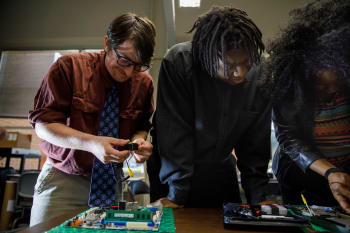Solving the Problem of Skills Mismatch

In today’s labor market, one of the most significant challenges faced by job seekers is the issue of skills mismatch. This phenomenon has far-reaching implications for both individuals and the broader economy. In this article, we will delve into what skills mismatch is and why it matters for job seekers. We’ll also explore practical solutions to bridging this gap, with a spotlight on the impactful employment programs offered by Generation.
What Is Skills Mismatch?
Skills mismatch occurs when there is a discrepancy between the skills that job seekers possess and the skills that employers require. This can manifest in several ways:
- Skills gaps: When job seekers lack the specific skills needed for available positions.
- Skills surplus: When job seekers have skills that are not in demand.
- Geographic mismatch: When there are suitable job openings in a different location from where job seekers reside.
This mismatch is a critical issue because it can lead to higher unemployment rates, underemployment, and a slowdown in economic growth. For job seekers, it means more extended periods of job searching, potentially settling for positions below their qualification level or working in jobs that do not fully utilize their skills.
Closing the Skills Mismatch Gap: Solutions for Job Seekers
Understanding and addressing skills mismatch is crucial for job seekers as it impacts career growth, economic stability, competitiveness, and job satisfaction. Possessing the right skills enhances employability, ensures financial stability, and fosters personal fulfillment by aligning work with one’s interests. To tackle the issue of skills mismatch, job seekers can take several proactive steps:
Continuous Learning and Upskilling
Engaging in lifelong learning is essential. Job seekers should pay attention to:
- In-demand skills: Research industry trends to determine which skills are currently in high demand.
- Online courses and certifications: Platforms like Coursera, Udemy, and LinkedIn Learning offer a plethora of courses that can help bridge skills gaps. Here at Generation, we offer online employment programs that equip you with the skills you need to succeed.
Networking and Mentorship
Building a robust professional network and seeking mentorship can provide valuable insights and opportunities.
- Join professional associations: Participate in industry-specific groups to stay updated and connect with professionals.
- Seek mentors: Find experienced professionals who can offer guidance, advice, and support. Here at Generation, our program methodology includes mentorship and an alumni community that follow you into the workplace and beyond.
Practical Experience
Gaining hands-on experience is crucial for skills development.
- Interning and apprenticing: This provides practical experience and can often lead to full-time employment.
- Freelancing and volunteering: Working on projects, even on a voluntary basis, can help develop and demonstrate skills.
Geographic Considerations
Job seekers can close the skills mismatch gap by considering remote work opportunities and making informed decisions about where to live based on job demand. Remote work allows individuals to access a broader range of opportunities that match their skills, while relocating to areas with high demand for specific expertise can significantly enhance employment prospects.
- Seek remote roles: Tap into a wider job market regardless of location, expanding opportunities that align with your skills.
- Choose locations based on job demand: If moving is an option, research and relocate to regions with booming industries or sectors that need your specific expertise.
Soft Skills Development
In addition to technical skills, behavioral skills and mindsets (aka soft skills) are increasingly important.
- Communication and teamwork: Effective communication and the ability to work well in teams are highly valued by employers.
- Problem solving and adaptability: Employers look for candidates who can think critically and adapt to changing circumstances.
Improve Your Skill Set With Generation
Generation is a global nonprofit organization that prepares, places, and supports people into life-changing careers. Our programs are particularly effective in addressing skills mismatch by providing:
- Industry-specific training: Generation offers training programs tailored to specific industries, such as technology, healthcare, customer service, and more. These programs are designed in collaboration with employers to ensure that the skills taught are directly relevant to job market needs.
- Holistic support: Generation’s approach is comprehensive, providing not only technical training but also soft skills development, mentorship, and support services, such as financial literacy and mental health resources.
- Strong employment outcomes: Generation boasts impressive employment outcomes, with 85% of graduates placed in jobs within six months of completing the program. Our alumni frequently report significant improvements in their career prospects and quality of life.
- Community and alumni network: Graduates of Generation programs join a supportive community and alumni network, offering ongoing opportunities for professional development and networking.
- Accessibility and inclusivity: Generation’s programs are designed to be accessible to a wide range of individuals, including those from underrepresented backgrounds. This inclusivity ensures that more people have the opportunity to gain the skills they need for meaningful employment.
Skills mismatch is a pressing issue in the modern job market, but it is not insurmountable. By embracing continuous learning, developing behavioral skills and mindsets, and leveraging targeted employment programs like those offered by Generation, job seekers can effectively bridge the skills gap. These strategies not only enhance employability but also pave the way for fulfilling and sustainable careers.
At Generation, our mission is to train, support, and place people into otherwise inaccessible career opportunities that can change their lives. Explore our employment programs to see the professions we support, or donate today to help us create career opportunities for our learners!